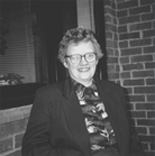You are here
- Home
- Resources and publications
- Life stories
- Mabel's story
- Introduction
Introduction
Mabel Cooper: an autobiography

My name is Mabel Cooper. I'm 56 years old, and I live in Shirley, Croydon. This is the full story of my life. It is my autobiography.
I was born on the 10th August 1944, in Islington, London. Although I didn't know it at the time, my mother was homeless and begging on the streets of London. When I was just four weeks old I was taken into care. I never saw my mother again. I stayed in care for years and years, first in children's homes and then for over 20 years in St Lawrence's Hospital in Caterham, Surrey.
I know this now. But I didn't know any of it (except for my birthday) when I first started trying to find out about the past, my past, and what happened to me. I'm finding out the schools I went to and why I was expelled. I keep finding out the names they called people in those days, and what they called me. I'm finding out about my mum because I've never known her.
My life story is in two parts. The first part is called 'Mabel Cooper's Life Story'. I did this with Dorothy Atkinson from what I could remember about my life. Then I did a second part called 'Mabel Cooper: My Quest to Find Out'. This is where we looked at my records and found out some more about the past. Both parts are put here together for the first time.
Telling the story
I did this with Dorothy. We met at a meeting where she was trying to get some history from people from telling their stories. Then we met on the train going home and I said I would like to tell my story. I started telling her a bit about St Lawrence's Hospital in Caterham where I used to live and she said she would come up to London and put it on tape. And she did, she came to my home in Croydon, and then she took it, and put it on paper, and brought it back to me to tell me what she'd done.
Why the story matters
It's an achievement with me being in St Lawrence's for so many years, and not knowing anything else but St Lawrence's. I thought it would be nice to let people know what it was like, and to let people know how difficult it was for someone with a learning disability, and who was stuck away because of that. I thought that people outside should know these things because they're not aware of it at the moment and I think it would be nice.
I think it was nice for me to be able to do something, so that I could say 'I've done it'. It made me feel that it was something I had done. You've got something so that you can say, 'This is what happened to me'. Some of it hurts, some of it's sad, some of it I'd like to remember. My story means a lot to me because I can say, 'This is what happened to me', if anyone asks. So it's great, and I will keep it for the rest of my life. I will keep the book.
The story was important to me because I'd been wanting to do this for a long time and I wouldn't have been able to do it, only I met Dorothy. It was very important to me to tell them about St Lawrence's and the way it was when I went there. And it's been a great joy, I've enjoyed it and, for me, it's something that, you know, I would do again.
Something to show
You've got something to show for your life. You've got something so that you can say, 'That's what happened to me'. It will keep history in my mind for years to come, what's happened to me and a lot of others like me.
The next part is my story as I told it from memory. This is the first part of my new book.
Contact us
About the Group
If you woud like to get in touch with the Social History of Learning Disability (SHLD) Research Group, please contact:
Liz Tilley
Chair of the Social History of Learning Disability (SHLD) Research Group
School of Health, Wellbeing and Social Care
Faculty of Wellbeing, Education and Language Studies
The Open University
Walton Hall
Milton Keynes
MK7 6AA
About the website
If you have any feedback or would like to report a problem with the website, please contact WELS-Research-Admin@open.ac.uk.